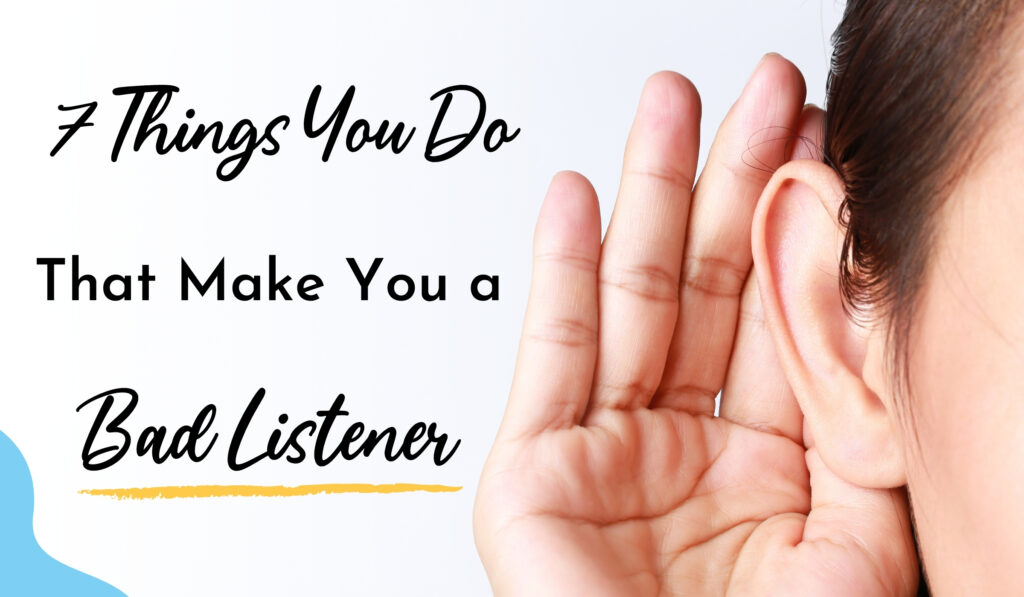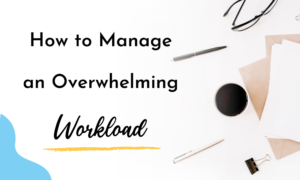Think back to a time when you cut someone off mid-sentence.
You may not remember it too well, but they probably do.
It’s easy to think that our active listening skills are on par but the reality is, many of us fail to effectively show that we’re truly listening.
This can lead to hurt feelings and miscommunications both at home and in the workplace.
In this post, I’ll share 7 things you do that make you a bad listener and how to work on them.

1. You Multitask
If your eyes are glued to your phone screen and not the person talking to you, you’re not truly listening.
The problem with multitasking is that our brain can only focus on one thing at a time.
Studies show that trying to do two things at once can cause us to be less efficient at both tasks.
If you want to learn how multitasking has negative effects on your brain and work ethic, check out my other post here.
Not making eye contact with them will make the other person feel ignored, unappreciated, and like you don’t care about what they have to say.
What you can do:
Whenever someone starts talking to you while you’re in the middle of something, do one of two things:
- Stop what your doing, make eye contact, and listen
- Ask them politely to hold on as you wrap something up, because you want to give them your full attention.

Do you want to be more productive in the morning without all the stress? Let me help you set your day up for success with my FREE Morning Habit Challenge!
Enter your name & email below to get your hands on it!

2. You do most of the talking
I’m sure you’ve been in a room with someone whose words flow out like the Nile river, with no end in sight (or earshot).
If you’re someone who is a talker, practice being more mindful of how much you’re talking in a conversation.
Are you truly engaging in a back and forth dialogue or is it more of a one-way street?
If you talk too much, you may annoy the listener, as they will feel like they can never get a word in.
Not everyone’s like you
If you are extroverted, know that introverts may become fatigued by your well-intended but long-winded discourse.
On the flip side, introverts must understand that it’s through lively conversation that extroverts get most of their energy and enjoyment.
What you can do:
Make sure you are not doing most of the talking.
If you’ve been telling a story for a while, switch up the roles and ask them a question to get them talking.
“The most important words that will ever pass between you and your prospective customers are the words spoken by them – not by you.”
Go Givers Sell More by Bob Burg & John David Mann

3. You switch the conversation to be about you.
What’s wrong with the following dialogue?
Them: “My cousins and I went skiing last weekend in Big Bear.”
You: “I’ve been to Big Bear once. I went down a black diamond run and was the first one to the bottom!”
You made the conversation about your experience, not their experience.
A habit like this won’t make you a great listener.
Instead, you could’ve asked them how their experience at Big Bear went.
“How long have you been skiing? What all did you explore there?”
Pivoting the conversation from being “me-focused” to “you-focused” will lead to improved listening skills.
What you can do:
Ask open-ended questions like who, what, where, when, why, and how to get them to share more about their story.
You want to show you care and are curious to hear more.

4. You frequently interrupt the speaker
Nothing is more annoying than having someone interrupt you.
The majority of the time, this is not malicious and the interrupter isn’t even aware of their fault.
This most often occurs when we are engaging in a lively conversation and are eager to chime in with our two cents.
Human nature, right?
Even if the intent is innocent, interrupting the speaker is still disrespectful and can demonstrate bad active listening skills.
What you can do:
Always wait until the other person has finished their sentence before responding. Bite your tongue if you need to, but don’t open your mouth until they’re done.
One good way to keep yourself from interjecting is to fully listen to what they say, without thinking about what you’re going to say.
This keeps the focus on them, and they’ll be able to tell.

5. You give advice too often, and when it’s not wanted
If you’ve ever tried to vent to a friend only to be slapped with a “here’s how to fix your problem” kind of answer, then you know how irritating unsolicited advice is.
Offering advice has its own time and place.
Stop trying to fix problems
When you offer your advice to others it can make the other person feel inadequate.
It doesn’t give them a chance to figure out a solution on their own.
Sometimes the urge to offer this kind of “help” can stem from a feeling of superiority, which may be subconscious.
Nonetheless, there are times when people welcome your advice, but don’t assume it’s all the time.
What you can do:
Ask the person talking if they want your opinion. You can say things like:
“Would it be more helpful for me to offer my advice to you or just listen?”
“I’ve been through something similar. Do you want to know what I did about it?
Communication is key here.
Just ask what they truly need from you, and they’ll let you know.

6. You don’t ask questions
We talked about the blunder of sharing your unwarranted opinion too often, but staying completely quiet can come off as if you’re not listening.
Couple that with no eye contact and you’ve got a recipe for a disengaged conversation.
People love talking about themselves, so encouraging them to share more is like surprising a toddler with a lollipop.
They love it.
What you can do:
Ask open-ended questions at least a few times during the conversation to fuel engagement.
This allows the speaker to share more rather than just give a yes or no answer.

7. Your body is turned away from the speaker
Are you facing toward them or away from them?
This is actually more important than you may think.
Studies show that our perception of someone’s credibility is based mainly on body language and tone of voice, with surprisingly little attention to the actual words.
Without even saying a word, the speaker can tell that you’re disengaged.
What you can do:
Turn your body toward the person talking to you and make eye contact.
This shows that you want to listen and respect them enough to be fully engaged.
Having your body turned away or eye contact lost only conveys your lack of interest.
Final Thoughts
We all have some listening skills that could use some sharpening. If we don’t work on being active listeners, our relationships may suffer in the long run.
Luckily, through self-awareness and conscious effort, we can turn the boat around and become much more engaged with those around us.
A recap of points:
- Multitasking while listening
- Doing most of the talking
- Making the conversation about you
- Frequently interrupting the speaker
- Giving advice when it’s not asked for
- Not asking questions
- Having your body turned away
Developing good, active listening skills plays a big part in becoming a better conversationalist, too. Improve your ability to build rapport by checking out my other post here!








